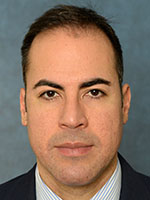Senior Reporter
Infrastructure and the Trump-Biden Presidential Debate

[Stay on top of transportation news: Get TTNews in your inbox.]
The two men who will clash on national TV on Sept. 29, as each seeks the highest office in the land, have a few similarities. For instance, they’re about the same age. They have amassed quite the collection of unforgettable gaffes. And, not so long ago, each one said certain infrastructure systems here in this country resembled those from Third World countries.
The former Vice President, Joe Biden, in what was presumed to have been a gaffe, called the airport at LaGuardia a Third World campus. He would go on to clarify his remarks, despite insisting that said airport necessitated a modern look.
Campaigning for the job at 1600 Pennsylvania Ave. four years ago, then candidate Donald Trump, a prolific marketer, said he possessed the skills vital for realizing the rehabilitation of the country’s crumbling, inefficient, and Third World-esque infrastructure. He called himself a “Builder-in-Chief,” and painted political opponents’ policy proposals in shadowy chiaroscuro.

Mulero
A couple of years after winning the White House, the incumbent president, still fond of his infrastructure bona fides, has yet to deliver on infrastructure policy, for which he has blamed Democrats.
The former vice president, seeking to unseat Trump, has unveiled a plan. Biden has proposed a multitrillion-dollar severe-weather resilient infrastructure vision that would be backed primarily through a reversal of the Trump-era tax cuts. The grandiose plan is easier said than done.
The two political veterans face off the evening of Sept. 29 in a must-see-TV event. The debate will occur as Congress readies the process to fill the vacant Supreme Court seat, the president’s interesting history with taxes is fresh on people’s minds, and the country’s COVID-19 tribulations continue.
Infrastructure is not officially on the debate’s agenda (candidates’ records, Supreme Court, COVID-19, the economy, race and violence in cities). However, the issue could come up during discussions on their records or on the economy.
The Week Ahead
Sept. 29, 2 p.m.: The National Academy of Sciences, Engineering, and Medicine hosts a webinar on connected and autonomous vehicles.
Sept. 29, 9 p.m.: Incumbent President Donald Trump and former Vice President Joe Biden meet for a debate.
Sept. 30, 10 a.m.: The House transportation committee considers legislation about the Federal Emergency Management Agency, and other measures.
Freight Corridor
The Federal Motor Carrier Safety Administration's revised regulations for hours of service take effect Sept. 29. Here are the four changes.
Election 2020: Gardner v. Hickenlooper

Gardner
Relatively new upgrades to the airport in Denver are among myriad infrastructure improvements, large and small, to occur in the Centennial State. Various modernization projects that have helped to improve the flow of traffic for truckers and commuters alike are the result of decades of hard-fought negotiations and difficult funding decisions. Many officials have contributed to the outcomes of these major public works projects. Still, ask an elected official about them, and they would be very likely to take the credit.
To be fair, during Sen. Cory Gardner’s one-term tenure, transportation connectivity improvement programs have advanced. In Washington, with a seat on the trucking policy panel, the senator also introduced legislation that would suspend a tax on the purchase of new trucks. Still, the Republican incumbent remains among the most vulnerable senatorial candidates in this election cycle, despite reminding voters of his central role in helping to assist agencies across the state.

Hickenloooper
His Democratic challenger, former governor John Hickenlooper, highlights his years running the state’s administration and his mayorship in Denver before that, as proof of his ability to deliver for constituents.
The somewhat-popular Hickenlooper, who flirted with a presidential run, is on the attack — pointing to Gardner’s close ties to the Republican caucus on Capitol Hill and President Donald Trump’s agenda. In addition, his small-business background has shown to appeal with a working-class bloc.
Since it remains hard for any candidate to make a clear runaway in a battleground state, Gardner and Hickenlooper continue to answer to the concerns of the local diaspora. Health care, climate change, the economy, and transportation are among the Rocky Mountain themes in this election.
 Buzz
Buzz

A new COVID-19 economic package is on the horizon, various insiders tell Transport Topics.
Favorite Video
The cliche is true: If you got it, a truck could have brought it.
Favorite Tweet
Congressional gridlock new normal is here to stay.
Easy prediction: once McConnell jams through Trump's SCOTUS pick, the Senate will not approve (or even vote on) any SCOTUS nominee by a president of the other party. When prez and Senate are opposite parties, vacancies will stay open...for 4-8 years, even. You heard it here. — Jonathan Rauch (@jon_rauch) September 22, 2020
The Last Word
Over the last few months, the vulnerability of African American, Latinx, Native American, and other black and brown people has been unmistakably demonstrated as we ride wave after wave of crisis — a global pandemic, a tanking economy and systemic racism repeatedly manifesting as physical violence.
Del. Eleanor Holmes Norton (D-D.C.), chairwoman of the Highways and Transit Subcommittee.
We publish weekly when Congress is in session. E-mail emulero@ttnews.com with tips. Follow us @eugenemulero and @transporttopics. Jerry Laguerre, a New Jersey-based communications specialist previously with ESPN and the New York Daily News, contributed to this report.
Want more news? Listen to today's daily briefing:
Subscribe: Apple Podcasts | Spotify | Amazon Alexa | Google Assistant | More



